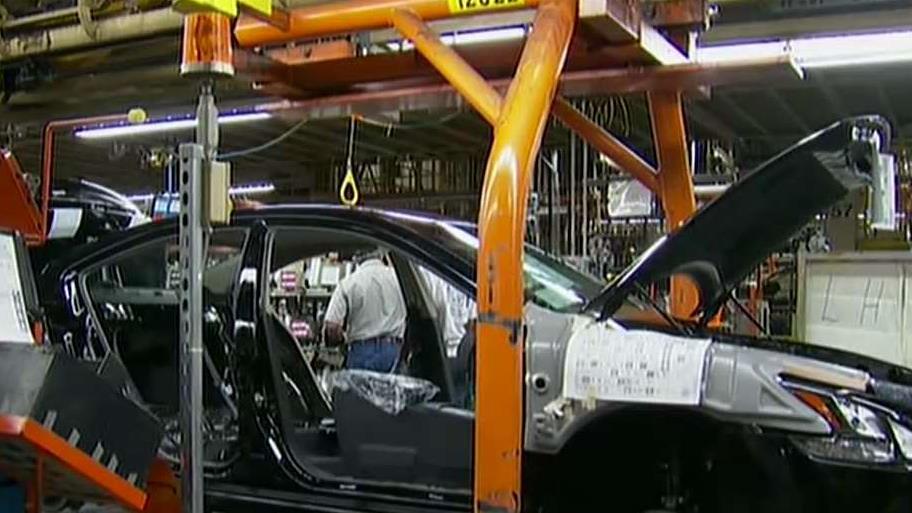Trump mulls new auto tariffs as industry braces for outcome
The Commerce Department on Sunday provided the White House its long-awaited report on whether to impose double-digit tariffs on imports of vehicles and auto parts to the U.S., lurching the industry into deeper uncertainty as it waits to see how President Trump will act.
The study – which is not expected to be made public immediately – comes amid growing concern that Trump will seek to impose the duties as a way to leverage new trade deals and potentially try to bolster U.S. manufacturing. The imposition of tariffs could come in many different forms, driving further nervousness in the sector. Regardless of the scope, any escalation would have a sweeping effect on the auto industry at-large.
“In every scenario considered new vehicle dealership revenue and employment fall,” the Center for Automotive Research wrote in a recent report. “Dealerships are likely to experience a decline in revenue totaling between USD 6.1 billion and USD 43.6 billion, with associated employment losses of between 10,700 and 77,000 employees.”
Canada and Mexico are likely to be excluded, given the White House is trying to convince Congress to finalize a revamped trade deal between the three nations and a side-letter on the agreement effectively prevents it.
The major question is whether Trump will levy duties on European and Asian countries, which includes the bulk of the world’s auto production. Such a move would have a dramatic effect on foreign and domesetic carmakers alike, roil global markets and likely lead to immediate price hikes for consumers.
| Ticker | Security | Last | Change | Change % |
|---|---|---|---|---|
| F | FORD MOTOR CO. | 13.80 | +0.08 | +0.58% |
| GM | GENERAL MOTORS CO. | 84.24 | +0.94 | +1.13% |
| FCAU | NO DATA AVAILABLE | - | - | - |
| VWAPY | VOLKSWAGEN AG ADR | 11.9667 | +0.06 | +0.48% |
| HYMTF | NO DATA AVAILABLE | - | - | - |
The potential ramifications highlight the complex nature of global auto production, where parts are sourced from countries around the world and vehicles are transported between nations in different stages of production.
Alongside foreign manufacturers like Volkswagen and Hyundai, companies like Ford Motor Co. and General Motors that are based in the U.S. would also face higher costs for many of their components – almost certainly resulting in increased vehicle prices as carmakers will try to mitigate the impact.
The industry is likely to find strong allies on Capitol Hill. Republicans like Senate Finance Chairman Chuck Grassley -- who has jurisidction over such matters -- have cautioned Trump against imposing the new tariffs.
"Raising tariffs on cars and parts would be a huge tax on consumers who buy or service their cars, whether they are imported or domestically produced," the Iowa Republican said recently. "Without question, any tariffs that are imposed will have a negative effect on the U.S. auto industry and our economy."
The uncertainty of the future of the tariffs has paralyzed an industry that thrives on long-term planning. And while companies could take some steps to further blunt the impact, shifts in production or supply chains are costly and time-consuming -- elevating the likelihood of immediate price hikes as a quick way for relief from the added costs.
"Dealerships must continue to operate under a cloud of uncertainty, not knowing if at any moment their products will be slapped with 25 percent tariffs, raising vehicle and repair costs by thousands of dollars and slashing sales," American International Automobile Dealers Association CEO Cody Lusk said in a statement. "Dealers, their employees, and the communities they serve are being treated like pawns by their government."
CLICK HERE TO GET THE FOX BUSINESS APP
Trump’s trade agenda has already had an outsized impact on the global auto sector. Double-digit tariffs on steel and aluminum imports are raising costs for nearly every manufacturer. Ford, for example, said the levies could add as much as $700 million in 2019.
Meanwhile, the tariffs on $250 billion in Chinese products is sparking fear of an economic slowdown in the country that is helping drive lower sales in the world’s most lucrative auto market. GM’s sales in China, for example, dropped 21.7 percent in the three months through December.




















